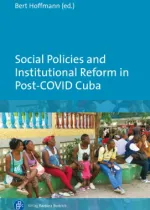Social Policies and Institutional Reform in Post-COVID Cuba

Overcoming social inequality and guaranteeing minimum social standards for all have been central achievements of Cuban socialism. But across-the-board subsidies for food and housing, decent pensions for the elderly, and the universal provision of quality education and health services are not sustainable over time without a solid economic foundation.
Well before the COVID 19 pandemic hit, the Cuban government put the reform of Cuba’s economy, institutional structures and social security schemes on the political agenda. The impact of the pandemic, stepped-up US sanctions, domestic contradictions and the generational change in the leadership are now putting the island’s of governance and social cohesion to an unprecedented test.
This volume brings together a unique set of experts from on and off the island, from different disciplines and political perspectives, to make a multifaceted analysis of the challenges of social policy and institutional reform in post-COVID Cuba. It is the result of the cooperation between Cuban and European academics in the Jean Monnet Network “Foro Europa-Cuba”
eISBN: 978-3-8474-1692-0
DOI: 10.3224/84742546
Publication content
Bert Hoffmann
Social Policies and Institutional Reform in Post-COVID Cuba: A Necessary Agenda
Part I: Social Policies
Laurence Whitehead
Governance Challenges in Contemporary Cuba: Social Policies and the UN’s Sustainable Development Goals
Betsy Anaya Cruz / Anicia García Álvarez
Social Policy in Cuba: Public Administration Challenges and Achievements
Blandine Destremau
“Who is Going to Take Care of Me?” Care and Ageing in Cuba: a Social Policy Challenge
Mireia Carrasco Ferri / María Jiménez Campos
Habitat Management in Old Havana: Housing Cooperatives as an Urban Resilience Mechanism for Comprehensive Rehabilitation and Sustainable Tourism
Anicia García Álvarez / Betsy Anaya Cruz
Food Access in Cuba: Current Situation and Challenges
Part II: Institutional Transformation of economic life
José Antonio Alonso / Pavel Vidal
The difficulties of Institutional Change in Cuba
Marcel Kunzmann
“Neither Plan nor Market”. Problems and Coherence of the Gradualist Reform Approach
Louis Thiemann / Claudia Mare
Multiple Economies and Everyday Resistance in Cuba: A Bottom-up Transition
Ruxandra Ana
Bailarín, Bailador, Callejero, Inflador: Being/Becoming Professional on Cuba’s Dance Scene (An ethnographic Approach)
Rosa María Voghon Hernández
Cuban Institutional Reform and the Crossroads of Inequality in the 21st Century
Part III: Constitutional reform and beyond
José Chofre-Sirvent
Cuba’s 2019 Constitution and Socialist Constitutionalism: Realities and Challenges
Carmen Antón Guardiola
The Reception of International Treaties in Cuba in the Light of the 2019 Constitution
Yanina Welp
Deliberation in the Constitutional Reform Process: Cuba in Comparative Context
Francisco Sánchez
Stable Change in Cuba after the Constitutional Referendum